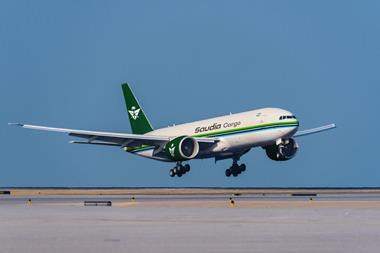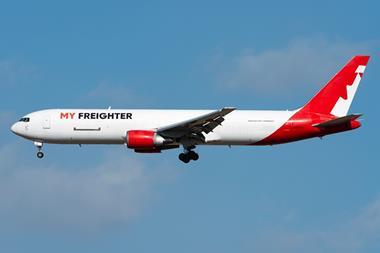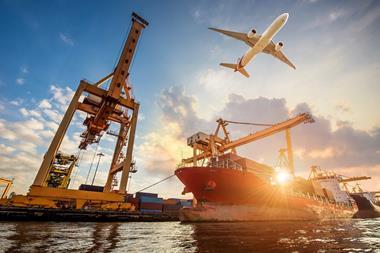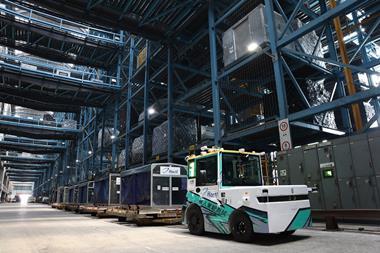
Homeworking and lockdowns caused a rapid rise in e-commerce as global consumers, denied access to shopping malls and high street stores, turned to online shopping, some for the first time.
In China, e-commerce was already riding high before the pandemic but, according to forecasts by research group eMarketer, some 52.1% of the country’s retail sales will come from e-commerce in 2021, up from 44.8% a year prior.
Alibaba has been at the centre of China’s e-commerce growth, not just selling goods but transporting them through its Cainiao Smart Logistics Network subsidiary.
Cainiao’s stated mission is for 24 hours delivery to anywhere in China and 72 hours to anywhere globally.
Key milestones achieved so far include more than 3,000 logistics partners, processing 16trn pieces of logistics data every day, and transporting 250m items of PPE during the pandemic to 159 countries.
James Zhao, general manager, Cainiao global supply chain, joined the business in 2014 after 12 years in a number of product and marketing management roles at eBay, FedEx, and TravelSky.
As a platform business, Cainiao does not own nor operate any aircraft but instead works with airline partners: “We have always had air cargo service via our global logistics network,” says Zhao.
Collaborative approach
Recent examples of that close collaboration have seen Cainiao link up with Hong Kong Air Cargo to launch cargo flights to Southeast Asia, and with Saudia Cargo for services from Hong Kong to Liege in Belgium.
It is also establishing seven “eHubs” at — or close to — airports where it can quickly carry out consolidation, transhipment and other activities to keep cargo travelling at speed.
At the time of the HK Air Cargo deal, Zhao said: “As one of the fastest-growing e-commerce markets in the world, Southeast Asia is projected to achieve a 23% compound annual growth rate to reach $172bn in 2025.”
He added: “With more cross-border e-commerce goods moving from Mainland China to Southeast Asia, the launch of cargo flights via Cainiao’s eHubs will allow us to create a seamless logistics network that will improve efficiency and reduce shipping time.”
As part of its flexible approach and rapid response to emerging challenges, Cainiao teamed up with Ethiopian Airlines to launch an airfreight pharma service for temperature-controlled medicines from Shenzhen Airport.
Says Zhao: “We are continuing to expand our air cargo network to support global distribution. Our recent partnership with Saudia Cargo will help to link up China with Europe and the Middle East.”
Cainiao’s global network will see massive expansion to handle growing e-commerce volumes across all modes. It already has an eHub close to Kuala Lumpur (KL) airport, with a second eHub due to open this summer at Liege and a third at Hong Kong.
What will this mean for Cainiao’s distribution capabilities and will there be more reliance on freighters and strategic partnerships with airlines?
Says Zhao: “[We gather] a large amount of cargo from within and outside the Alibaba economy.
“We gather cargo from South China, for example, and ship it to the eHub in Hong Kong, and then to the Cainiao Aeropolis eWTP Hub (eHub) in KL by air to distribute it across Southeast Asia.
“In this way, we can benefit from greater agglomeration effects. In this sense, products can be moved globally in a highly efficient manner from one eHub to another in a different region, which can then be distributed intra-regionally via air or land.”
He adds: “With the Cainiao Aeropolis eWTP Hub (eHub) in KL, one of the seven eHubs managed by Cainiao globally, we would have established a global logistics network via a hub and spoke model which increases efficiency and stability via the provision of end-to-end logistics services.
“The eHub involves multiple partners carrying out numerous functions to facilitate cross-border trade. They include an e-fulfilment hub based near KL International Airport, which will function as a customs clearance, warehousing and fulfilment centre for the region.
“A one-stop, online, cross-border trading services platform that will link the Malaysian eHub to the original one in Hangzhou, allowing for easier trade for [small and medium-sized enterprises] between the two countries, training programmes for start-ups and it also works to support Malaysia’s digital ambitions.”
Zhao says that the eHub in KL will serve as a distribution gateway into Southeast Asia and reinforce air, sea and land connectivity for greater operations efficiency.
Last but not least, the eHub will leverage smart technology such as automation, Artificial Intelligence and knowledge transfer, which will aid in the overall digital transformation of the industry.
But how does Cainiao intend to develop its relationships with freight forwarders and 3PLs, and what is the ideal commercial partner?
“Going back to two of Alibaba and Cainiao’s core values, which talked about placing the customers first and how trust is key to making everything simple, these values can be applied to the way we approach relationship management as we expand our network globally,” says Zhao.
“As a digital logistics platform, we adopt a collaborative approach to deliver value to partners.
“We empower the partners onboard our platform with an innovative and open data platform which improves efficiency along the entire value chain.
“For our commercial partners — ie, business to business — we are looking to strengthen our warehouse and trucking network to support businesses’ import and export needs.
“To achieve maximum efficiency, these overseas warehouses [are] located near to ports to facilitate transportation and are able to provide services for pre-stocking, storage and serve as a container freight station.
“Partners supporting the trucking network will also have to be well-equipped with resources such as lorries and container trucks to handle transportation of goods between warehouses and to ports.”
Cainiao last year launched a container booking service for seafreight, which did have an airfreight dimension. What has been the success so far for the airfreight aspect?
“So far, the demand lies mainly in seafreight container shipping given the current global container shortage.
“The launch of the container booking service is to alleviate the shortage crisis to benefit our customers who might otherwise be impacted by the surge in shipping rates.”
Taking a lead
But are there any particular [air cargo] logistical achievements that Cainiao is most proud of from the 11.11 online shopping festival in 2020?
“In the lead up to 2020’s 11.11 online shopping festival, we chartered more than 700 flights to deliver 90% of the parcels outside China which culminated in a 60% reduction in delivery time for more than half of the orders.
“Here, smart order consolidation, where we combine multiple parcels from various merchants into one package for shipment, also helped to bring about greater delivery efficiency on the whole.
“In fact, customers in key European cities such as Madrid, Paris, Berlin and Warsaw were able to receive their parcels in as fast as three days.”
Zhao continues: “As the event grows into a global phenomenon, we are also witnessing increasing participation from overseas merchants who are selling to Chinese consumers.
“Last year, we operated chartered flights and cargo ships bound for China to meet the growing demand from Chinese consumers for these overseas goods. This resulted in a 10% increase in delivery efficiency for over 300m goods shipped into China from 84 countries and regions.”
It is clear that Cainiao intends to grow its logistics capability, not just in airfreight, to meet the rapid growth in e-commerce across the globe.










